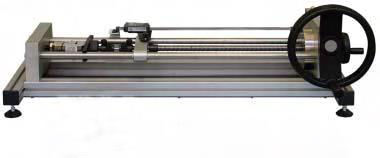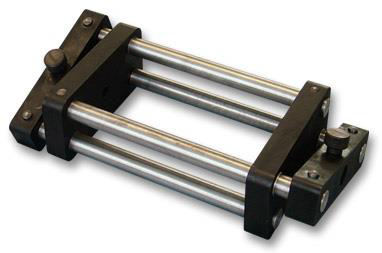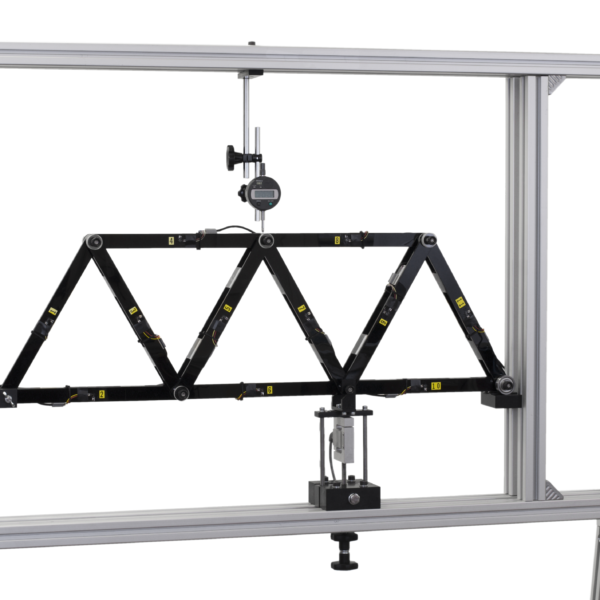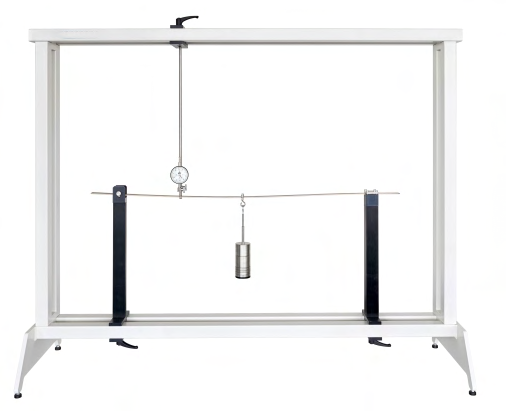Tensile Test Machine Model MT 100
Sci-tech Tensile Test Machine Model MT 100 has been designed to study the tensile tests on specimens made of different material.
With Sci-tech Tensile Test Machine Model MT 100, tensile test can be performed. A specimen made of different materials is subjected to an increasing axial tensile stress till failure. This unit allows the user to perform tensile tests with different materials, calculate the maximum tensile force, distinguish between the different regions of a stress-strain chart of a material subjected to tension, and obtain the yield point of the material.
The unit works with a specimen fitted between two bolts and protected by a protective cover. The bolts fix the material under study, fastening it by their ends.
Once the specimen is installed, a force is applied with the steering wheel till the material breaks. The backward movement of the springs when the specimen is broken is reduced by oil dampers installed between the movable and fixed parts.
During this process, the elongation of the material subjected to a specific tensile force can be measured. The measurement is obtained with the dial gauges and/or the digital caliper included.
The unit is supplied with a panel where the mechanism can be mounted for a more convenient operation.
Strength of materials is a subject of mechanical engineering, industrial engineering and structural engineering that studies the strain in deformable solid models. Strength is defined as the capacity to withstand stresses or loads applied on a body without permanently breaking, deforming or damaging it.
The tests related to this discipline are based on obtaining a relation between the forces applied to a material, called loads, and the strains and displacements generated on that material.
One of the most typical experiments is the tensile test. It is a mechanical test to determine the strength of a material by subjecting it to stress. It is classified as a destructive test (the material suffers failure or significant damage in its structure) in which a specimen is subjected to a tensile load till the material is broken.
Sci-tech Tensile Test Machine Model MT 100 has been designed to study the tensile tests on specimens made of different material.
With Sci-tech Tensile Test Machine Model MT 100, tensile test can be performed. A specimen made of different materials is subjected to an increasing axial tensile stress till failure. This unit allows the user to perform tensile tests with different materials, calculate the maximum tensile force, distinguish between the different regions of a stress-strain chart of a material subjected to tension, and obtain the yield point of the material.
The unit works with a specimen fitted between two bolts and protected by a protective cover. The bolts fix the material under study, fastening it by their ends.
Once the specimen is installed, a force is applied with the steering wheel till the material breaks. The backward movement of the springs when the specimen is broken is reduced by oil dampers installed between the movable and fixed parts.
During this process, the elongation of the material subjected to a specific tensile force can be measured. The measurement is obtained with the dial gauges and/or the digital caliper included.
The unit is supplied with a panel where the mechanism can be mounted for a more convenient operation.
- Anodized aluminum frame and panels made of painted steel. Main metallic elements made of stainless steel.
- Case and protector for the specimens.
- Structural panel of dimensions: 660 x 890 mm.
- Two guide bars of stainless steel.
- Protector for the specimen
- Three springs.
- Dial gauge, range: 0 - 20 mm; accuracy: 0.01 mm. Caliper. Digital.
- Twelve specimens made of S235JR steel (2 x 2 mm).
- Twelve specimens made of aluminum, purity 99.5 % (2 x 2 mm).
- Twelve specimens made of aluminum H-111, “Duralumin” (2 x 2 mm).
- Twelve specimens made of PVC (5 x 3 mm).
- Twelve specimens made of Nylon (2 x 2 mm).












